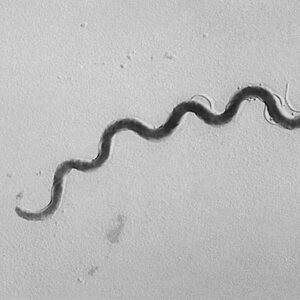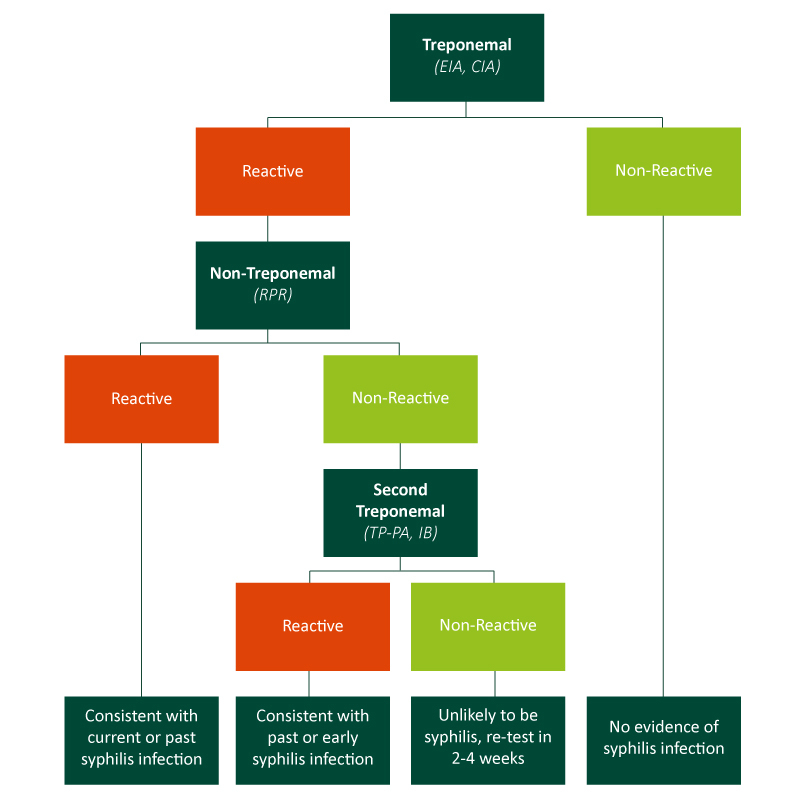
Laboratory Diagnosis of Syphilis Infection Remains a Challenge – Here’s Help
Syphilis infections (Treponema pallidum) continue to be reported at a high rate, both nationally as well as in Spokane County. Unless a person is symptomatic with primary lesions present on exam, syphilis must be confirmed through serologic testing. Unfortunately, there is no singular diagnostic test available for syphilis. Instead, we rely on multiple serologic tests in combination to confirm a syphilis diagnosis. Historically, two testing algorithms have been used (see table below). SRHD recommends the reverse algorithm for screening and initial diagnosis of syphilis. This means the treponemal test (EIA, TPPA, or FTA) will be run initially, and if reactive, it will reflex to the non-treponemal RPR (rapid plasma reagin) with titer. If two of the three tests are reactive, it is likely a case of syphilis and a clinician should consider treatment. If a patient has a history of syphilis, an RPR titer is all that is needed because the treponemal tests will likely remain reactive for life.

Initial diagnosis and screening for T. Pallidum infection
Given all the laboratory changes since PAML closed, we wanted to offer clarification on how to order a syphilis test through LabCorp and Quest and whether to expect confirmatory results from the state lab if results are reactive. Laboratories operating in Washington are required to submit a subsample to the WA PHL on any reactive syphilis serologies to confirm the diagnosis; these results will be received a few days after the initial screening results are provided.
LabCorp: 082345 Treponema pallidum Screening Cascade
Results can take up to ten days and may be reported individually as results come in. The initial screening test is an EIA, and the second treponemal test in this cascade, when indicated, is an Immunoblot. Because LabCorp runs its treponeme-specific tests outside of Washington, additional confirmatory testing through the WA PHL is not available for this cascade.
MultiCare providers: use code L00565 to order this test
Providence providers: all syphilis tests will be run at an internal Providence lab first. You will receive initial results from the Providence lab, followed by confirmatory results from the WA PHL.
Quest: 90349 Syphilis Antibody Cascading Reflex
Results can take up to ten days and may be reported individually as results come in. The initial screening test is an EIA, and the second treponemal test, when indicated, is a TP-PA. Expect confirmatory test results from the WA PHL.
Follow-up testing and screening in individuals previously infected with syphilis
Once a patient has been diagnosed with syphilis, an antibody test is no longer required as they will likely remain antibody-positive for life. In lieu of antibody testing, RPR titers should be monitored to ensure adequate response to treatment or need for re-treatment due to reinfection. RPR-only tests should only be considered if there is evidence of previous infection in the patient's medical records or have confirmed previous history with SRHD. If RPR titers vary between the initial lab and the WA PHL, SRHD typically advises treatment or follow up based on WA PHL results.
LabCorp: 006460 RPR Quantitation
If the RPR is reactive, providers will also get a titer reported. No subsample will be submitted to the WA PHL.
Quest: 799 RPR (Monitor) with Reflex to Titer
If the RPR is reactive, a titer will be reported as well. A subsample will be submitted to the WA PHL.
If you are unsure which test to order, or how to interpret syphilis serology results, please contact the SRHD HIV/STD Prevention. Program staff can also assist with verifying previous testing and treatment history, staging of infection, and partner management as it relates to syphilis. For confirmed cases of syphilis, SRHD can supply Bicillin if needed. Contact the SRHD HIV/STD Prevention program at 509.324.1494.
